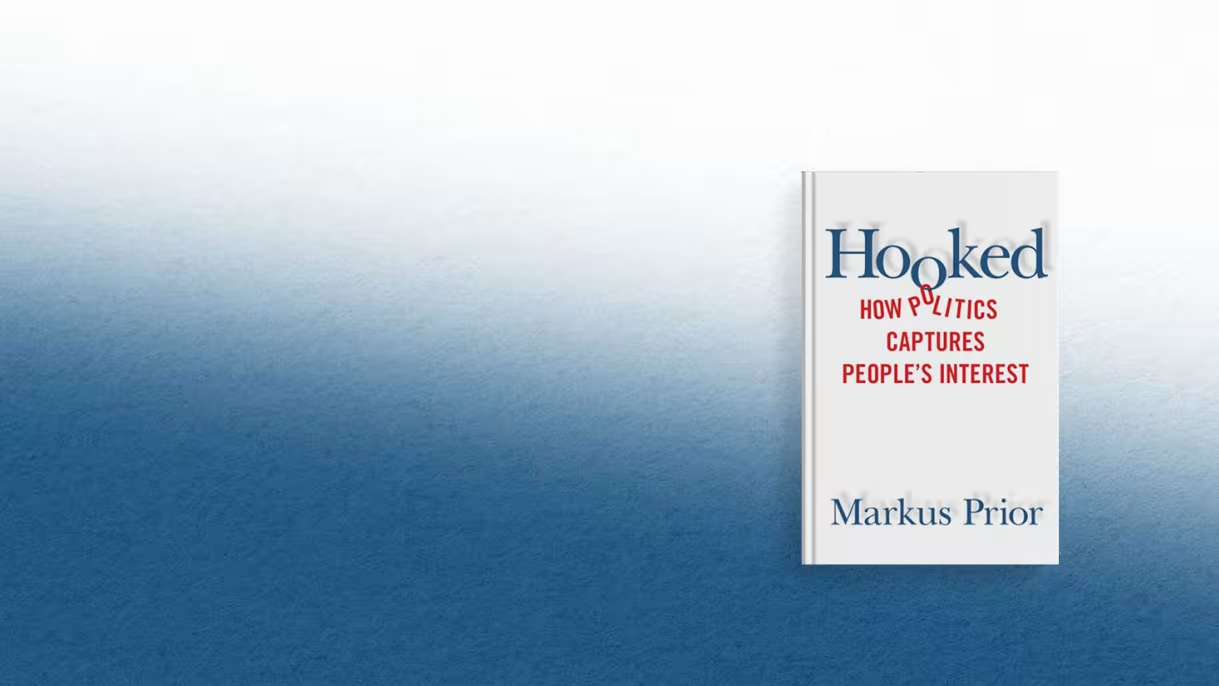

Hooked: How Politics Captures People’s Interest (Markus Prior)
“Good citizenship” is often a consequence of political interest, and early adulthood may be the most formative time to develop political passion, according to a new book by Markus Prior, a professor of politics and public affairs at the Princeton School of Public and International Affairs. As people take a greater interest in politics, they are likely to become more partisan, too.
In an accessible account, “Hooked: How Politics Captures People’s Interest” explains the underpinnings of political interest. Using data from three decades in four Western democracies, Prior reveals why political interest matters — and where and when it’s most present.
“Hooked,” published by Cambridge University Press, received the 2020 Robert E. Lane Award from the Political Psychology Section of the American Political Science Association and the 2020 Juliette and Alexander L. George Outstanding Political Psychology Book Award given by the International Society of Political Psychology.
Prior’s research examines how people learn about politics, the role of media in politics, the measurement of news audiences, and the impact and origins of political interest. In the Q&A below, he gives readers a preview of the book.

Q: Let’s start with a definition of political interest. What determines political interest in a society? Why does it matter?
Prior: Political interest is an internal state — you know if politics interests you. The most straightforward way to measure political interest is by asking people. Relying on what people say can be misleading, however, so I spent a lot of time making sure that different ways of asking give us the same answer and that people’s interest reports relate to civic behaviors we care about. They do. Political interest matters because it is probably the most important cause of getting involved in politics. If more people were interested in politics, they would participate more, think more about politics, and learn more about it.
Q: How have we seen political interest change in the U.S. over the past century?
Prior: It has barely changed! “Hooked” looks in detail not only at the United States, but also Britain, Germany, and Switzerland. In all these countries, political interest has been remarkably constant over the last half century. Only really momentous events, like the fall of the Berlin Wall, make a noticeable difference — and only for a few years. In the U.S., a few elections raised political interest, most notably President Ronald Reagan’s election in 1980 and President Barack Obama’s in 2008. But those are exceptions, and the increases were temporary. People mostly seem to know if politics is interesting to them or not, and it doesn’t depend much on what politics is about at any particular time.
Q: What motivated you to write this book, and what made you use these datasets, which aren’t often used in political contexts?
Prior: Researchers routinely include some measure of political interest in their analyses, and it almost invariably reveals strong associations with whatever they are studying. But we just didn’t know why. So I started my project to answer a seemingly straightforward question: Where does political interest come from? This question led me to datasets that political scientists have mostly ignored: studies that follow the same individuals over several decades and interview them once a year. Every year, participants report how interested they are in politics. It is absolutely fascinating to track how the same people change — and mostly don’t change — over such long periods. The book has many graphs that allow readers to see these trajectories for themselves.
Q: What are the book’s biggest policy implications?
Prior: Two insights stand out. First, if you want people to take greater interest in politics and get more involved, you have to accept that they will become more partisan. Political interest and partisanship are very strongly related, and this relationship appears to be causal. Change one, and the other will respond. We might dream of a politically informed and engaged public that remains somewhat detached and doesn’t get carried away (or worse) by partisan passions. That’s not going to happen. If you want to reduce partisanship, you will also make people less interested.
The second policy implication is about the opportunities for raising political interest. In adolescence and early adulthood — until about the mid-20s — political interest is still more malleable for many people. It doesn’t bounce around a lot, but you can see more change, especially among adolescents. This makes parents important agents of political socialization. The datasets I use interview all members of the sampled households, so I have great data on kids and their parents. Parents’ political interest strongly affects their children’s interest — especially if the parents are similarly interested and don’t vary too much over time. So if we want to encourage political interest, we should focus on young people. (That doesn’t mean that civics education helps automatically. When it is offered as an elective, the least interested children will opt out.)
Q: As you were researching and writing this book, did anything surprise you?
Prior: I didn’t expect political interest to fluctuate wildly, but I was still surprised by how stable it becomes in early adulthood. Journalists and media organizations have an incentive to emphasize the new, the shocking, the “breaking news.” But all that spectacle doesn’t draw in new people; it feeds the curiosity and desire for more political content of those who are already interested. That’s both hopeful and dispiriting: We don’t need to worry too much that much of the public might tune out politics. But we also shouldn’t be naïve about how difficult it will be to raise political interest beyond what it is today.
Q: Who should add the book to their 2022 reading list?
Prior: People who want to appreciate the good and bad about democracy and self-governance. People are the sovereign — we govern ourselves. But being part of governance is voluntary, and so many people opt out. Lack of interest is by no means the only reason for that, and even if everyone was strongly interested, democracy would be difficult, messy, and often inequitable. Still, our political system is built on voluntary participation by many. “Hooked” helps you understand the promise and challenge of that foundational principle.
My book shows you how the sausage is made. I was not interested in telling you a good story without also explaining how we know what we know about political interest. The reader gets to see the evidence, look at the data, and hear the basis for my conclusions. I get the irony: You want to be interested in politics (and political science) to enjoy “Hooked.”

